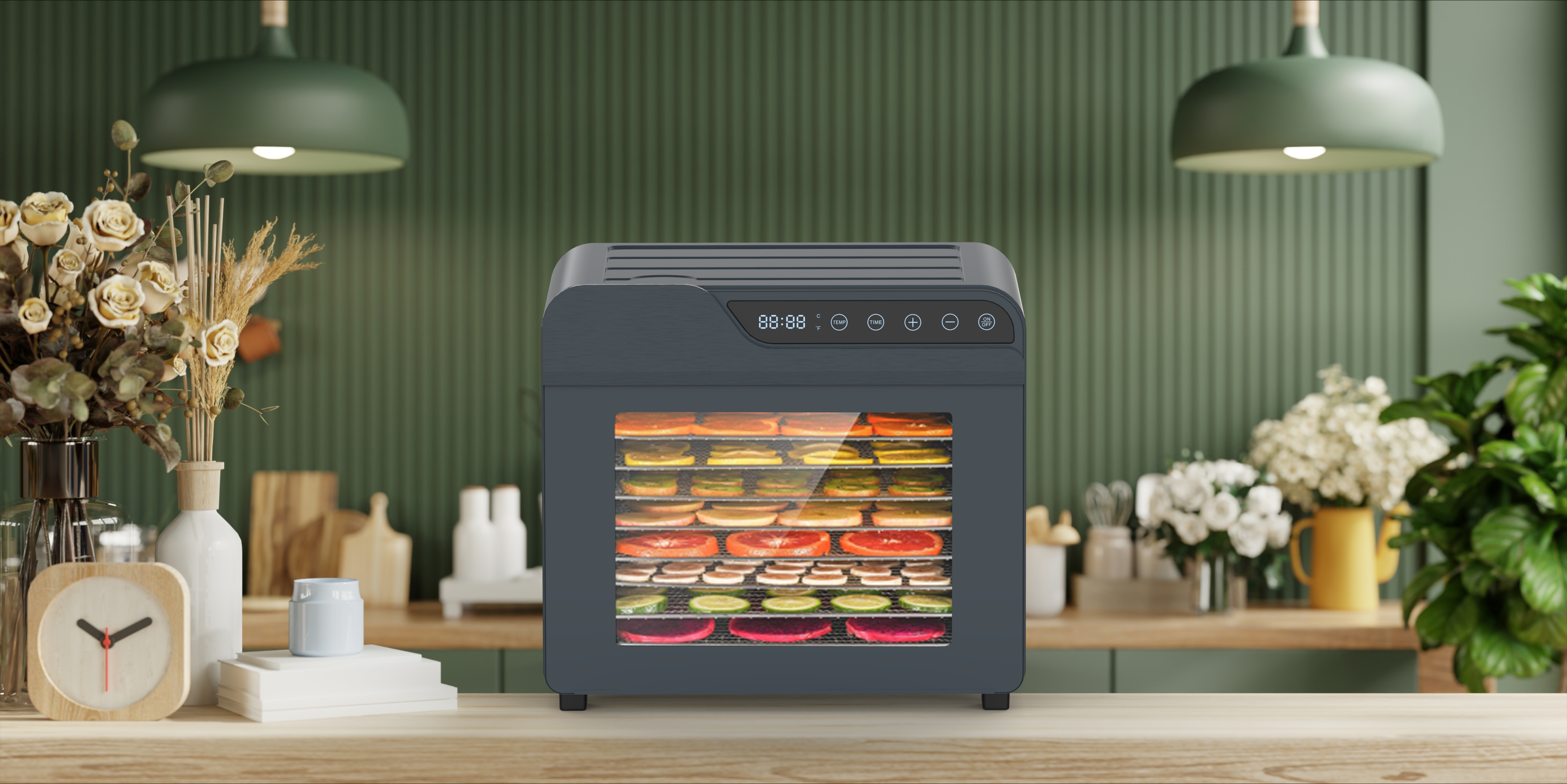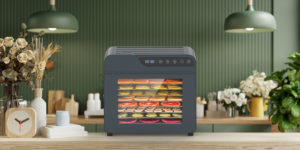As the Sales Manager at Foshan Linden Intelligent Appliances Co., Ltd., I’ve had the pleasure of guiding countless customers toward kitchen solutions that make healthy eating simple and sustainable. From our factory in China, we craft high-quality food dehydrators, alongside our 12L, 16L, and 30L air fryer ovens and air fryers, exporting to North America, Europe, Russia, and the Middle East. A question I often hear is: What’s the difference between a food dehydrator and a fruit dryer, and which is best for preserving produce? I’m excited to share my expertise and help you choose the right appliance for your kitchen.
In this article, I’ll compare food dehydrators and fruit dryers, focusing on functionality, versatility, and performance for preserving produce. Drawing from our experience at Linden, where we design innovative appliances with customizable features, I’ll break down the pros and cons to help you make an informed choice. Let’s dive into the world of food preservation!
Understanding Food Dehydrators and Fruit Dryers
Before we compare, let’s clarify what these appliances are. At Linden, we specialize in food dehydrators, but the term “fruit dryer” often pops up in conversations. Both appliances remove moisture from food to extend shelf life, but their capabilities and design differ slightly.
What Is a Food Dehydrator?
A food dehydrator is a versatile appliance designed to dry a wide range of foods, including fruits, vegetables, herbs, meats, and more. Our Linden food dehydrators use a heating element and fan to circulate warm air, preserving nutrients and flavor. According to WebMD, dehydrated foods retain most of their vitamins and minerals, making them ideal for healthy snacking.
What Is a Fruit Dryer?
A fruit dryer is typically a specialized or simpler version of a dehydrator, focused primarily on drying fruits. These devices may have fewer features and are often marketed for home cooks who want to dry fruits like apples, mangoes, or berries. While effective for fruit, they may lack the versatility of a full-fledged food dehydrator.
Why Compare the Two?
I’ve seen buyers at trade shows and on our website, lindensmart.com, weigh these options carefully. Understanding their differences helps you choose the appliance that best fits your preservation needs, whether you’re drying a single type of fruit or a variety of foods.
Key Differences: Food Dehydrator vs Fruit Dryer
Let’s explore the main differences between food dehydrators and fruit dryers. These factors influence performance, versatility, and suitability for preserving produce.
Versatility and Functionality
Food Dehydrators: Multi-Purpose Powerhouses
Our food dehydrators at Linden are designed for versatility. They handle fruits, vegetables, herbs, meats, and even specialty items like fruit leather or yogurt. With adjustable temperature settings, you can dry delicate herbs at 95°F or meats at 165°F for safe preservation. This makes them ideal for home cooks who want to experiment with a variety of recipes.
Fruit Dryers: Focused Simplicity
Fruit dryers are more specialized. They’re optimized for drying fruits, often with preset temperatures suited for fruits like bananas or strawberries. While effective for this purpose, they may lack the temperature range or capacity to handle meats or delicate herbs, limiting their versatility.
Temperature Control and Precision
Food Dehydrators: Customizable Settings
Our food dehydrators offer precise temperature controls, typically ranging from 90°F to 165°F. This allows you to tailor the drying process to specific foods, preserving their flavor and nutrients. For example, Healthline recommends lower temperatures for herbs to maintain their oils, which our dehydrators handle with ease.
Fruit Dryers: Limited Range
Fruit dryers often have fixed or limited temperature settings, usually optimized for fruits (around 130–140°F). This simplicity is great for beginners but may not provide the flexibility needed for other foods, such as jerky or vegetables, which require specific temperatures.
Capacity and Design
Food Dehydrators: Larger and More Robust
Our food dehydrators come with spacious trays, ideal for drying large batches of produce. The horizontal airflow design, praised by Consumer Reports, ensures even drying across all trays, making them perfect for preserving garden harvests or bulk produce.
Fruit Dryers: Compact and Basic
Fruit dryers are typically smaller, with fewer trays and less capacity. They’re great for small households or occasional fruit drying but may struggle with large quantities. Their stackable or simpler designs often require tray rotation to achieve even drying, which can be less convenient.
Ease of Use
Food Dehydrators: User-Friendly Features
Our dehydrators are designed for ease. They feature digital interfaces with preset modes for fruits, vegetables, and meats, taking the guesswork out of drying. Timers and adjustable thermostats make the process seamless, even for beginners.
Fruit Dryers: Simple but Limited
Fruit dryers are straightforward, often with basic dials or a single temperature setting. While this simplicity appeals to new users, it lacks the advanced controls needed for precise preservation of diverse foods.
Energy Efficiency
Food Dehydrators: Efficient for Large Batches
Our food dehydrators use 0.6–1 kWh per use, depending on the model, per Energy Star. Their efficient design and horizontal airflow reduce drying time, saving energy while handling large quantities.
Fruit Dryers: Low Power for Small Tasks
Fruit dryers typically use less power, around 0.4–0.6 kWh, due to their smaller size. However, their limited capacity means you may need multiple sessions for larger batches, potentially offsetting energy savings.
Cleanup and Maintenance
Food Dehydrators: Easy to Clean
Our dehydrators feature removable, non-stick trays that are dishwasher-safe. This makes cleanup a breeze, especially after drying sticky fruits like mangoes. The durable materials resist stains and odors, ensuring long-term ease of maintenance.
Fruit Dryers: Basic Cleanup
Fruit dryers also have removable trays, but they may not always be dishwasher-safe. Their simpler designs can collect residue in crevices, requiring more effort to clean thoroughly.
Health Benefits of Preserving Produce
I’m passionate about helping people eat healthier, and both appliances excel at creating nutritious, preservative-free snacks. Here’s why they’re great for preserving produce.
Nutrient Preservation
Dehydrating retains most nutrients, unlike canning or freezing, which can degrade vitamins over time. According to WebMD, dehydrated produce keeps its vitamins and minerals, making it a healthy choice for long-term storage.
Reduced Food Waste
Both appliances help save overripe produce. Drying fruits or vegetables before they spoil extends their shelf life, saving money and reducing waste. Our food dehydrators, with their larger capacity, are especially effective for bulk preservation.
No Additives Needed
With our dehydrators or fruit dryers, you control the ingredients. Create snacks without added sugars or preservatives, ensuring clean, healthy eating. This is a big reason customers love our appliances for wholesome snacking.
When to Choose a Food Dehydrator
I recommend our food dehydrators if you:
- Want to preserve a variety of foods, including fruits, vegetables, meats, and herbs.
- Need precise temperature controls for optimal results.
- Plan to dry large batches of produce.
- Value advanced features like timers and digital controls.
- Seek a durable, versatile appliance for frequent use.
Our Linden food dehydrators are perfect for home cooks who want flexibility and professional-grade performance.
When to Choose a Fruit Dryer
A fruit dryer is ideal if you:
- Focus exclusively on drying fruits like apples or berries.
- Have a small kitchen with limited space.
- Prefer a simple, budget-friendly appliance.
- Don’t need advanced features or large capacity.
- Are new to food preservation and want an easy start.
Fruit dryers are great for casual users who prioritize simplicity over versatility.
Can You Use Both Appliances?
I often tell buyers they don’t have to choose one over the other. A food dehydrator and fruit dryer can complement each other. Use a fruit dryer for quick, small batches of fruit snacks and a food dehydrator for larger, more diverse preservation tasks. Our Linden food dehydrators are designed to fit seamlessly into any kitchen setup.
Quality and Certifications
Quality is our top priority at Linden. Our food dehydrators undergo rigorous testing and meet international standards like UL and CE, ensuring safety and reliability for global markets. When choosing any appliance, check for certifications to guarantee performance and durability.
Logistics and Practical Considerations
From my experience with global buyers, logistics matter. Our food dehydrators are lightweight and easy to ship, making them popular for international orders. Fruit dryers are even more compact, ideal for smaller shipments. At Linden, we streamline production to meet tight delivery schedules.
SEO-Friendly Tips for Choosing Your Appliance
To help you decide, here are tips optimized for search terms like “food dehydrator vs fruit dryer” or “best appliances for preserving produce”:
- Define Your Goals: Decide if you need versatility or just fruit drying.
- Check Capacity: Ensure the appliance suits your batch size needs.
- Prioritize Efficiency: Look for energy-efficient models to save costs.
- Read Reviews: Explore platforms like CNET for user feedback.
- Test at Trade Shows: See appliances in action for hands-on comparisons.
Final Thoughts: Which Appliance Is Best for You?
As someone who loves helping people preserve food naturally, I believe our food dehydrators are the top choice for most home cooks. Their versatility, precise controls, and large capacity make them ideal for preserving a wide range of produce. Fruit dryers are great for beginners or those focused solely on fruit, but they can’t match the flexibility of our Linden models. Your choice depends on your preservation needs, kitchen space, and budget.
Ready to start preserving your produce? Visit lindensmart.com to explore our food dehydrators, or email me at sales4@fslinden.com for personalized advice. Let’s make healthy, long-lasting snacks a reality in your kitchen!
Meta Title: Food Dehydrator vs Fruit Dryer: Best for Preserving Produce
Meta Description: Compare food dehydrators and fruit dryers to find the best appliance for preserving produce. Learn about versatility, performance, and health benefits.




